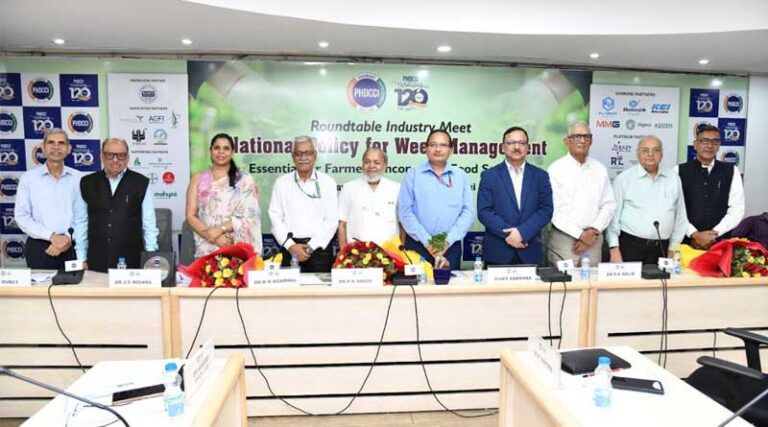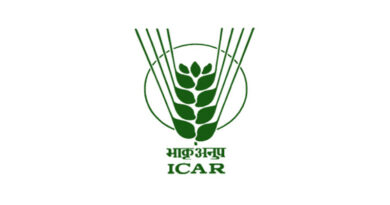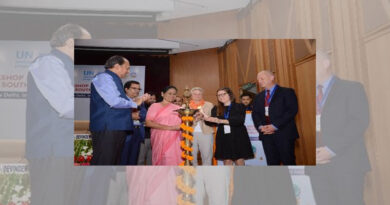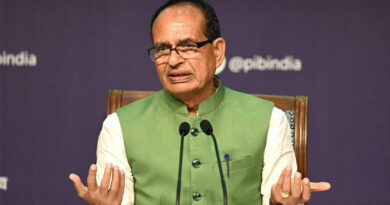
National Roundtable Calls for Urgent National Policy on Weed Management to Safeguard Food Security
Experts, policymakers, and industry leaders converge at PHD House to deliberate on the role of weed management in India’s agri-future
30 May 2025, New Delhi: In a high-level roundtable organized by the Agribusiness Committee of PHD Chamber of Commerce and Industry (PHDCCI) at its headquarters in New Delhi, stakeholders from industry, academia, and government gathered to deliberate on a pressing issue: the urgent need for a National Policy on Weed Management. Themed “National Policy for Weeds Management: Essential for Farmers’ Income and Food Security,” the event aimed to bring key voices together to craft a future-ready strategy that addresses the growing threat of weed infestation in Indian agriculture.
Advocacy and a Call to Action
Opening the event, Dr. R. G. Agarwal, Chair of the Agribusiness Committee at PHDCCI and Chairman Emeritus of Dhanuka Agritech Ltd., emphasized that “there is no denial that agriculture without herbicides is nearly impossible.” Citing FAO statistics, he noted that pests—including weeds—cause up to 40% loss in crops globally. “India must promote the judicious use of pesticides and herbicides. The future of weed control lies in innovation, but this demands robust data protection and a stronger intellectual property regime,” he added.
Ms. Mili Dubey, Assistant Secretary General of PHDCCI, welcomed participants and reiterated the chamber’s commitment to driving grassroots change. “Weed management is a topic that urgently needs attention from both industry and policymakers. Under the leadership of Dr. Agarwal, the Agribusiness Committee has worked consistently to address implementation and policy-level gaps,” she said.
Weed Control and India’s Food Security: A National Imperative
The roundtable comes against the backdrop of growing concern over food and feed security in India as it marches towards its centenary of independence in 2047. With the country’s population projected to exceed 1.6 billion by then, and arable land availability largely static, increasing productivity on existing farmland is the only viable path forward. Weeds continue to remain a critical, yet under-addressed, factor in crop loss, causing 25–26% yield reduction in Kharif crops and 18–25% in Rabi crops.
Mr. N. K. Arora, Secretary General of the Governing Council of Kisan Vigyan Foundation (KAKV), the Knowledge Partner for the event, explained the foundation’s mission. “KAKV has been working on crucial areas of food security and raising red flags where required. We are engaging with policymakers and implementation agencies to streamline key policy bottlenecks and accelerate approvals in collaboration with industry associations.”
Ground Realities and Research Insights
Delivering the theme presentation, Mr. Vijay Sardana, Chairman of Kisan Vigyan Foundation, noted the lopsided focus of national agricultural planning. “We still talk mostly about wheat and rice while importing 70% of our edible oil and significant amounts of pulses. With per capita landholding shrinking to 0.1 hectare—and expected to go down to 0.08 hectare—we must address all components of food security, including weeds, which directly hurt our productivity and farmers income.”
Dr. J. S. Mishra, Director of ICAR-Directorate of Weed Research (Jabalpur), delivered a comprehensive keynote address. “Weeds are the biggest issue for Indian farmers. Climate change and changing cropping patterns are creating new weed flora. While herbicides are essential, their indiscriminate use leads to resistance,” he cautioned. Dr. Mishra proposed forming a Herbicide Resistance Action Committee in India, advocating for new chemical formulations, inclusion of minor crops in label claims by the Central Insecticides Board and Registration Committee (CIBRC), and a push for green chemistries and bio-herbicides.
Perspectives from Policy and Industry
Dr. R. K. Malik, Member of KAKV’s Governing Council and a veteran researcher, recalled past experiences when herbicides had to be distributed under police protection due to high demand. “Today, every farmer applies 2–3 herbicide sprays. It is time we move towards precision farming, using technology to reduce per-hectare herbicide dosage. India must transform its herbicide registration processes to allow innovative solutions to reach farmers faster.”
Adding a farmer-centric view, Mr. Anil Ghanwat, farmer leader from Maharashtra and KAKV council member, called for greater mechanization. “Even small farms in China use advanced mechanization. India must incentivize similar technologies and consider the introduction of GM crops to cut cultivation costs,” he urged.
Industry leaders raised concerns over existing regulatory gaps. Mr. Raju Barwale, Chairman of Mahyco Pvt. Ltd., highlighted the lack of alignment between policy and innovation. “Farmers are not waiting. They are already bringing in technologies like GM papaya from abroad. There is a clear neglect from policymakers in this space,” he said.
Dr. R. D. Kapoor, Head – Agri Support and Alliances at PI Industries Ltd., pointed out that the Rs 6,000 crore herbicide segment is growing at 10% annually. “Stewardship is critical. Premature resistance emerges when products are misused. The CIBRC must recognize the need for proper product application research before releasing herbicide mixtures,” he emphasized.
Government’s Vision: Integrated and Forward-Looking
Delivering the Chief Guest Address, Dr. P. K. Singh, Agriculture Commissioner, Ministry of Agriculture and Farmers Welfare, spoke on the holistic efforts behind India’s foodgrain output reaching 354 million tonnes in 2024-25. “New high-yielding varieties, irrigation, soil health, and plant protection are driving this growth. However, we must also bridge yield gaps by diversifying into horticulture and high-density plantations that naturally suppress weeds,” he said.
Dr. Singh criticized the delayed introduction of new herbicide molecules in India. “Companies are now bringing 20-year-old chemistries. Why didn’t they patent them earlier and bring them to Indian farmers? We need faster processes, but we also need accountability.”
A Call for National Policy and Coordinated Action
In his concluding remarks, Dr. Ramendra Singh, Governing Council Member, KAKV, strongly advocated for a National Weed Management Policy. “Manual weeding is unsustainable and expensive. Herbicide resistance is spreading, and weed flora are shifting. India must act now by forming a Herbicide Resistance Action Committee in India and promoting stewardship across all crop types, including minor crops,” he concluded.
Collaboration, Innovation, and Speed
The roundtable discussions reflected a strong consensus among stakeholders. Experts emphasized that Integrated Weed Management (IWM) is a viable strategy and must be promoted across states. Suggestions included empowering state governments to regulate herbicide sales based on university trials, creating drone-specific SOPs, and enabling precision spraying tools like flat-fan nozzles—still largely unavailable to farmers.
Speakers also highlighted the benefits of Imazethapyr-tolerant rice varieties, which are saving farmers Rs 8,000–10,000 per hectare, underscoring the need to scale such innovations.
The roundtable concluded that weed management is no longer a side note in agricultural policy but a central pillar in India’s quest for food and nutritional security. As the country prepares for Vision 2047, participants unanimously called for a national-level, science-backed, and farmer-first policy on weed management—one that is nimble enough to foster innovation and strong enough to ensure accountability.
The event concluded with a resolve to take the recommendations forward to policymakers and push for timely interventions that protect both farm income and national food security.
Also Read: Insecticides India Limited (IIL) Launches New Herbicide Altair for Paddy Farmers in India
📢 Reach Farmers, Share Your Story, and Grow Your Brand!
Got news to share? A company story to highlight? Looking to launch an impactful advertising campaign? Connect with us at info@krishakjagat.org or nimishgangrade@krishakjagat.org and make your mark!
📢 Connect with 100+ Million Farmers! India’s leading farmers rely on Krishak Jagat’s Hindi website for trusted agriculture news, advisory and insights. Click here to explore!






